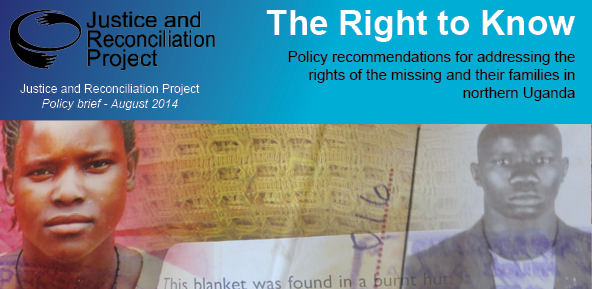
Overview
Increasingly, the missing victims of mass atrocities around the world are being formally recognised as a key impediment to genuine social repair and transitional justice. A recent conference organised by the International Commission on Missing Persons (ICMP) found that where a concerted effort was made to locate and identify the missing victims of mass atrocities some of these impediments were overcome. Going forward, the international community now recognises that the missing victims of past and ongoing mass atrocities are an urgent global concern that warrants a structured and sustained response that works in tandem with local government and civil society organisations. As such, the Government of Uganda and Ugandan civil society organisations, in collaboration with relevant sectors within the international community, have a legal and moral obligation to address the missing victims of Uganda’s recent civil war in order to promote genuine social repair and transitional justice in northern Uganda.
In line with these international developments, and building upon its history of working with families affected by the recent civil war, the Justice and Reconciliation Project (JRP), in collaboration with the families of the missing, launched the “Right to Know” campaign in 2012 to promote awareness of the plight of the missing and the anguish of their families. JRP has since completed a pilot study in Palabek Kal and Palabek Gem sub-counties in Lamwo District that establishes the circumstances under which people disappeared, examines past and present coping strategies used by the affected communities, evaluates surviving families’ needs, and provides recommendations for civil society organisations, the Ugandan government and international actors.
This policy brief communicates the findings of this pilot study, drawing upon individual interviews and focus group discussions with families of the missing, formerly abducted persons, cultural leaders and local government leaders. These categories of participants were chosen to gain a multidimensional understanding of the lingering challenges faced by northern Ugandans whose lives have been intimately impacted by their missing relatives. Specifically: the needs of the surviving families, their sources of information on the missing, the impact of their search for information on the community, and any cultural or governmental processes that have allowed them to move forward while living with ambiguous loss. It then draws upon outreaches conducted by JRP in communities across northern Uganda to gain a better grasp of the situation.
Key recommendations
This policy brief recommends that the Government of Uganda, in collaboration with the international community and civil society organisations (CSOs) in northern Uganda, should take the following actions:
- Formally and publicly acknowledge the missing victims of war and related atrocities in northern Uganda as a prominent obstacle to social repair;
- Ensure a comprehensive transitional justice policy framework and subsequent legislation that reaffirms forced disappearance as a crime against humanity and, within this legal prohibition, formally recognises the rights of the missing and their surviving families;
- Establish an independent commission on missing persons to collaborate with surviving families to generate a centralised database and oversee search efforts;
- Provide economic support and skills training for the families of the missing so they can better overcome their unique economic burdens; and
- Support ongoing research in northern Uganda beyond Palabek toward identifying regional particularities related to the needs of families of the missing.
Download this entire policy brief here: JRP Policy Brief – The Right to Know, August 2014 (pdf)
